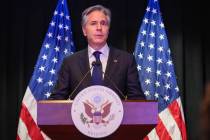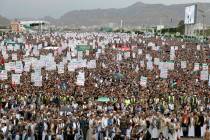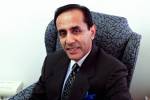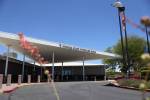UMC cutting more services
The decision to end oncology services to nearly 300 Southern Nevadans at University Medical Center is just the beginning of cutbacks at the county hospital.
Nevada's serious economic woes, combined with lower-than-expected Medicaid reimbursement rates and county-based indigent funding, has UMC looking at other medical care services to chop, officials said Friday.
The hospital is preparing a document for the Clark County Commission's upcoming meeting to discuss other possible cuts in services, said Kathy Silver, UMC's chief executive officer.
"I think our primary obligation is to the financial viability of our public hospital. Periodically, UMC has had some financial troubles and they are often linked to the economic conditions of the time,'' said Clark County Commissioner Rory Reid. "This current issue regarding oncology services is probably the first of many services up for evaluation. I think that if we're confronted with a $20 million cut in Medicaid, we have to react. We can't just do what everyone wants us to do.''
On Thursday, UMC announced its contract with the Nevada Cancer Institute was ending Dec. 31. Under the contract, which had been set to expire in 2010, the cancer institute's physicians provided in-patient and outpatient care to UMC patients.
Silver said UMC has no plans to contract with another Las Vegas oncology group nor would it be offering these services to the public on an outpatient basis. The move leaves 200 to 300 patients -- about half of whom are uninsured -- seeking cancer care elsewhere in the Las Vegas Valley.
Silver said UMC could no longer afford to provide oncology services, which she said per patients costs in the hundreds of thousands of dollars. The drugs are also too expensive -- costing upwards of $10,000 per dose -- and some oncology patients rack up bills of $12,000 to $17,000 per visit, Silver said.
"We're not dealing with a huge number of patients that have great insurance coverage,'' she said. "We're dealing with patients who are on Medicaid, are Medicaid pending, with Clark County Social Services and are uninsured.''
It's unknown how many of the affected patients are illegal immigrants because the hospital does not track the immigration status of patients. Illegal immigrants do not qualify for Medicaid.
As for the possibility of cutting other health care services at the hospital, Silver said UMC is expected to lose about $20 million in revenue as a result of statewide cuts in Medicaid reimbursements.
Earlier this year, state officials announced a 5 percent cut to Medicaid reimbursement to hospitals.
Though those reductions were for services across the board, some services provided to women and children experienced deeper cuts.
For example, Silver estimates UMC will lose $8 million in revenue because Medicaid has cut reimbursements for Level III neonatal intensive care unit services by 24 percent.
Silver said UMC could lose an additional $12 million in revenue if the state accepts the Spending and Government Efficiency Commission's suggestion to allow funding from the Indigent Accident Fund and the Supplemental Income Fund to go toward reimbursing care for Medicaid and Nevada Check up enrollees.
Currently, those funds are only to be used to support medical care for indigents involved in automobile accidents or other unforseeable devastating health care events where costs exceed $25,000.
The funding comes from county property taxes -- 21/2 cents per $100 in assessed valuation -- and brings in roughly $25 million a year. However, the funding is expanded to include care for Medicaid and Nevada Checkup, the state could apply for federal matching dollars.
Medicaid is the state-run health insurance plan for the poor, and Nevada Checkup provides health insurance to low-income children.
Silver plans to meet soon with Gov. Jim Gibbons' senior staff to discuss what impact the SAGE commission's recommendation would have on UMC.
Chuck Duarte, administrator of the Health Financing and Policy Division, which runs the state's Medicaid and Nevada Checkup programs, said he expects even more cuts in the future.
He said the state's Medicaid program is experiencing an increase in enrollments, and applications for Medicaid rise with unemployment, officials said.
"The way things are looking now, I'd have to stop paying claims (Medicaid reimbursements) in April,'' he said. "Even if I stop paying claims, it'll only push the liability onto the next year.''
Reid said UMC as well as the state are doing what families are doing across the country during hard times.
"We are looking at what it is we can do without,'' he said. "These are very difficult choices to make. We're talking about health care and people's lives. ... If we don't do what we need to do, then nobody will get any care.''
Silver said the hospital's staff plans to assist patients undergoing cancer treatment on an outpatient basis in finding other services throughout the Las Vegas Valley.
For UMC's in-patient cancer patients, the plan is to ask the hospital's staff oncologists to consider treating those patients on a rotational basis.
That means any patient who is diagnosed in UMC's emergency room with cancer will be treated by one of the hospital's staff oncologists on a rotational basis.
Typically, oncologists with privileges bring in their own patients, Silver said.
Contact reporter Annette Wells at awells@reviewjournal.com or 702-383-0283.























